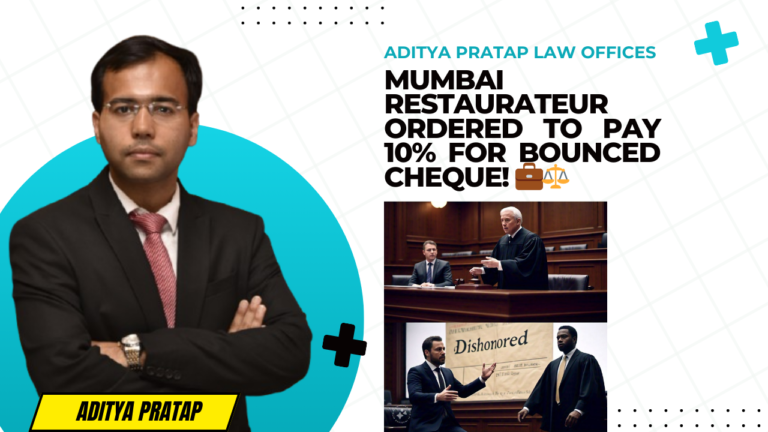
The Court Metropolitan Magistrate at Andheri directed a prominent Mumbai based Restaurateur to pay 10 per cent (10%) interim compensation to the holder of a bounced cheque under section 143A of the Negotiable Instrument Act, 1881. The case involved failure to repay a private loan followed by dishonour of security cheque. Advocate Aditya Pratap represented the complainant in the case.
Brief Facts of the case:
Appearing for the complainant and the holder of the bounced cheque, Advocate Aditya Pratap introduced his client as an NRI (Non-Resident Indian) working for a reputed Multi-National Company (MNC). The accused person, a hotelier approached him seeking a loan of Rupees Twenty-Five Lakh (Rs. 25,00,000/-) for the purpose of running and expanding operations.
Loan of Rs. 25 lakhs advanced to Accused Hotelier against Bill of Exchange and Security Cheque of the Corresponding Amount:
The loan proposal of the accused hotelier was accepted by the Advocate Pratap’s Client who agreed to advance a sum of Rupees Twenty-Five Lakh (Rs. 25,00,000/-) from his personal funds and savings.
The Accused Hotelier acknowledged the debt by using a bill of exchange and security cheque of the like amount. The said bill of exchange was payable on demand.
Accused Defaults on Loan – Bill of Exchange and security cheque Both Dishonored – Criminal Complainant filed under section 138 along with Application for interim compensation 143A of the NI Act, 1881:
Elaborating further on the fact of the case, Advocate Aditya Pratap explained that after a few periodic interest payments the accused hotelier fraudulently defaulted on the entire principal amount along with accrued interest. After numerous fruitless reminders, the complainant presented the bill of exchange for re-payment, which was dishonored pursuant to dishonor of the bill of exchange; the security cheque was also presented. Pursuant to sending the required statutory notice, the complainant proceeded to file a criminal case under Section 138 of the negotiable Instruments Act, 1881. An application for interim compensation under section 143A was also filed alongside the criminal complaint.
Arguments advanced before the Court:
Stressing on the urgent need to award interim compensation to his client under Section 143A, Advocate Aditya Pratap submitted that his client had made out a strong prima facie case. He submitted that his client was a salaried N.R.I. who had lent his hard-earned money to the accused on interest. The cheque of Rs. 25 lakhs was issued in discharged of a debt and was dishonored on ground of ‘funds insufficient’.
Arguments advanced by the Accused Hotelier:
The application for interim compensation faced vigorous opposition from the accused hotelier. He accused the complainant of being an unlicensed moneylender. He also claimed that the loan extended by the complainant was a friendly loan which did not carry any interest commitment or repayment timeline.
Rebuttal Arguments by Aditya Pratap:
The arguments of the accused were strongly rebutted by Advocate Aditya Pratap. He firstly contented that the accused person could not borrow money default and then refuse to pay by calling the complainant an “unlicensed moneylender”. It was a classic case of “Pot calling the Kettle Black”.
Advocate Pratap further pointed out that there was never any friendship between the Complainant and the Accused. Both were introduced to each other in the course of a business transaction. Therefore, the question of a friendly loan did not arise at all in the first place.
Reasoning of the Court and Final Order – Ten Percent interim compensation awarded to complainant.
Having heard both sides, the Learned Magistrate took note of the fact that the accused person had admitted receiving Rs. 25 lakhs from the complainant. A prima facie offence was thus committed by the accused since the trial and decision of the case would take time a fit case was made out for grant of interim compensation under section 143 A of the Negotiable Instrument Act,1881.
Accordingly, the learned Magistrate allowed the application filed by the complainant and awarded interim compensation amounting to ten percent of the total cheque value. The accused was to pay this amount within sixty days of the order. In addition the court also imposed an obligation upon the complainant to refund this amount in the event of acquittal of the Accused.

About the Author
Aditya Pratap is a practicing lawyer and founder of Aditya Pratap Law Offices based in Mumbai. An alumnus of NALSAR University of Law, Hyderabad, he has over 11 years of experience and has handled numerous cases of public and private significance. For more insights, you can visit his website: adityapratp.in. Watch him in TV interviews.